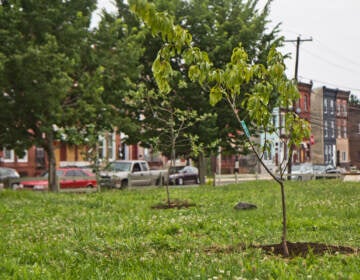DVRPC in hunt for suburban tree planting grant
The Delaware Valley Regional Planning Commission is trying to get into the tree-planting business in a big way.
The board approved a $2.73 million grant application that, if successful, would pay for the planting of 3,355 trees in the Philadelphia suburbs, including in Chester City, Millbourne, New Hope, Warminster and Norristown.
DVRPC applied jointly with the Pennsylvania Horticultural Society, which would choose the specific tree species and handle planting and two years of tree tending.
The grant application was submitted to Pennvest, an independent state agency that provides funding for infrastructure initiatives.
Patty Elkis, associate director of comprehensive planning, said the money would also cover the removal of dead trees and explained the program was decided to reduce stormwater runoff.
DVRPC had also wanted to conduct plantings in Coatesville and South Coatesville, she said, but the transition to a new city manager for Coatesville made agreeing on a set of projects difficult. South Coatesville does not have a stormwater management ordinance in compliance with state law, and Elkis said Pennvest would refuse the grant request if the municipality had been included.
Rina Cutler, Philadelphia’s deputy mayor for transportation and utilities, cautioned that DVRPC should make provisions for tree maintenance beyond the two-year window. The city, she said, has experienced problems with the survival and maintenance of trees after planting and is working to put such a system into place.
The DVRPC Board also voted to open up a mandated public comment period for drafts of the fiscal 2011 Pennsylvania and fiscal 2012 New Jersey Transportation Improvement Plans.
The drafts, which are scheduled for release next week, outline transportation funding for the region.
The comment process is scheduled to end before an expected board vote in July.
The DVRPC also approved four Job Access Reverse Commute and three New Freedom applications for South Jersey.
The first program subsidizes reverse commuting options for low-income residents, and the second program subsidizes the commutes of people with disabilities.
The board also got an update from Bill Van Wagenan, of CH2MHILL, the firm that holds the contract to do planning with the Pennsylvania Department of Transportation on the Interstate 95 project.
He said the upgrade and reconstruction of the 51 miles of the highway in Pennsylvania is expected to cost about $8 billion.
Work on the first of five segments ― this one located in Philadelphia ― began in 1999. The last contract for that segment is scheduled to be let in 2020.
Work on the interstate is focused on repairing existing infrastructure and changing the design of the road to reduce congestion and improve travel.
However, Van Wagenan warned that because of a dearth of funding, it will take 40 years at the current rate to replace the highway ― which he called an “unacceptable time frame” because it greatly exceeds its expected life span.
His firm’s 10-year contract has been divided into three phases, with the first 12 to 18 months devoted to coming up with a strategy for corridor reconstruction.
The second phase focuses around design management and review, as well as managing a public input process.
The final phase involves construction oversight in conjunction with PennDOT.
Contact the reporter at acampisi@planphilly.com
WHYY is your source for fact-based, in-depth journalism and information. As a nonprofit organization, we rely on financial support from readers like you. Please give today.




